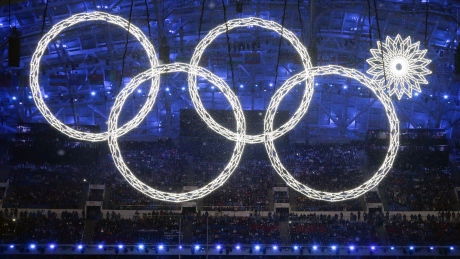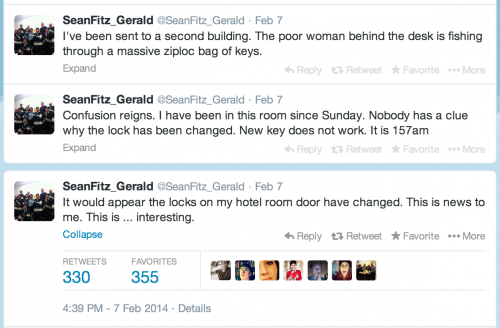
“Perks” of the Profession

Oops…the 2014 Winter Olympics in Sochi, Russia opened with a mishap and it continued from there. Photo Credit: The Daily Currant
As a journalist focusing in sports casting and reporting, I have definitely kept up with the 2014 Winter Olympic media coverage. While I have enjoyed seeing everything from USA slopestyle skiers Joss Christensen, Gus Kenworthy and Nicholas Goepper sweep the medal podium in the men’s freestyle skiing competition, to Meryl Davis and Charlie White earn the USA’s first-ever gold medal in the ice dancing event, there has been some coverage that has really grabbed my attention.It may not be an Olympic event, but part of me thinks those that have “overcome” deserve medals.
Who you may ask…? — the journalists.
If you’ve been following the Olympic coverage you’ve probably seen the tweets and online articles of the “less-than-cozy” conditions of the hotels in Sochi, Russia.

After spending a week in his hotel National Post reporter Sean Fitz-Gerald arrived at his hotel room to find that the locks had been changed. Photo Credit: @SeanFitz_Gerarld;
What I find interesting is more of the public’s reaction to the images rather than the actual tweets from the journalists. Most of the reporters tweeted sarcastic comments with the pictures and were poking fun at the conditions. Whereas if you based your knowledge off the public’s reactions, you would’ve thought the world was coming to an end…well sort of.
While I found the reporters’ reactions quite comical, it also stood as a testament to what it means to be a sports reporter—going beyond just the bad hotel conditions.

Team USA bobsledder Johnny Quinn resorted to his own antics to gain access into his room. Photo Credit: @JohnnyQuinnUSA
So many sports fans think that being a sports reporter is the best job ever. You get to attend high-profile games, interview celebrity athletes and travel all over the place to work. Although all that is true, being a sports reporter comes with a price as well. It’s not all fun and games—the “perks” of the profession come with a cost and one I’ve experienced first-hand.
Coming into the program I knew I wanted to be a sports reporter. I was the first-born child of a former minor league baseball player, started playing softball as soon as I could walk and my sports life escalated from there. I not only loved being an athlete and growing up in a sports-oriented family, but I also loved going to sporting events of all kinds. It wasn’t until high school and college that I really knew I wanted to be a sports journalist. While I loved being the athlete, I greatly enjoyed interviewing, researching and following other athletes throughout their careers.
As my involvement in sports journalism has progressed, I have experienced the work, the hours and the daily challenges that go along with being a sports reporter—and let me tell you, it goes beyond the poor hotel conditions and the dreaded locker room interviews.

After Chicago Tribune reporter Stacy St. Clair was informed that her hotel had no water, she followed up with this tweet. Photo Credit: @StacyStClair Twitter account
You do endless research on stats and background information. You sift through athlete-to-athlete, coach-to-coach and team-to-team comparisons. And that’s just the prep work. Once you wave your press pass at the front gate, you enter a whole other world.
One that is not full of cheering, popcorn and soda.
Nope. It’s one filled with constant stat keeping and meticulous “watching” of every play in the game. You have to keep track of who scored, who threw or passed them the ball, who made the diving catch, who rebounded the missed shot, who fouled who and at what time in the game did the star point guard hit the 3-point shot to put his team in the lead during the third quarter.
You sit there surrounded by team rosters, notebooks and pens. You don’t cheer. And if you do buy popcorn before the game, you might eat a fourth of it. While you’re constantly keeping track of every play and individual players’ stats, you’re simultaneously thinking of what plays you can speak to in your interviews and then highlight in your article.
Once the final buzzer sounds, you rush to double check your stats with the scorer’s desk before heading to the locker room. During your trek you’re thinking of key points in the game that you want to use to fuel your interview with each coach and the “chosen” players.
While the fans are headed out to the bars or the local Applebee’s for half-off appetizers—trust me I know this to be true because I used to be a waitress—you are finishing up your interview, heading out to your car and checking the time to see if you have “the ideal” full two hours to complete your game stats and write your article, or if you’re sitting at the 1:30:00 mark before deadline.
Depending on where your game is, you have to make a quick decision on where you want to write your story:
“Can I make it back to the newsroom with enough time to stat and write?”
“I could go to that Starbucks down the street instead…”
or
“I should just go home, that way I won’t be driving back after midnight.”
These are all thoughts and contemplations most sports reporters have. You spend the majority of your drive to the newsroom, café or your humble abode thinking about your lead and how you want to structure your article. Once you arrive to your “working” desk, you can bet people will suck up your precious time asking you what happened in the game. And you can bet you’ll be thinking, “Would you just be quiet and wait to read my article in tomorrow’s paper?”
You finish your stats and then sit down to write—working to find a way to depict the game through words. Throughout the article, you’re working to find the right balance and right words that will keep it objective and touch on the key points of the contest. As if you haven’t been constantly peeking at the clock to make sure you’re going to make deadline, your editor calls you to see if you’re almost done.
Sometimes it feels like you just might not make the cut, but once you press “submit,” you find your breath again, sit back and breathe a sigh of relief.
Then it’s on to prepping for the next game.
It may not be all fun and games like some may think, but it’s worth it in the end. Being a sports reporter, you take the good with the bad. While you don’t necessarily get to “enjoy” the game, you do get to report on events and people that fans marvel at and talk about for years and years to come. And that’s why I like being a sports reporter.
